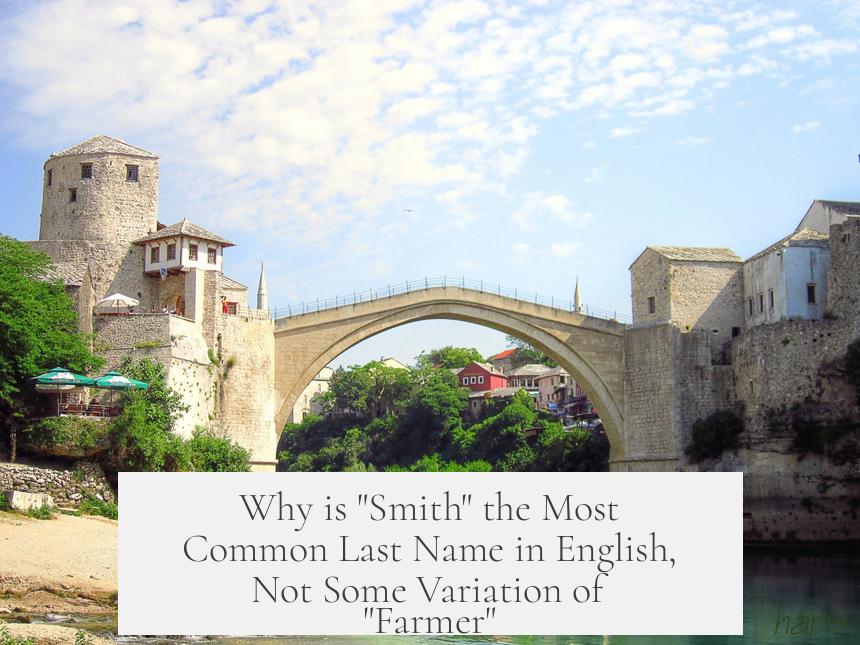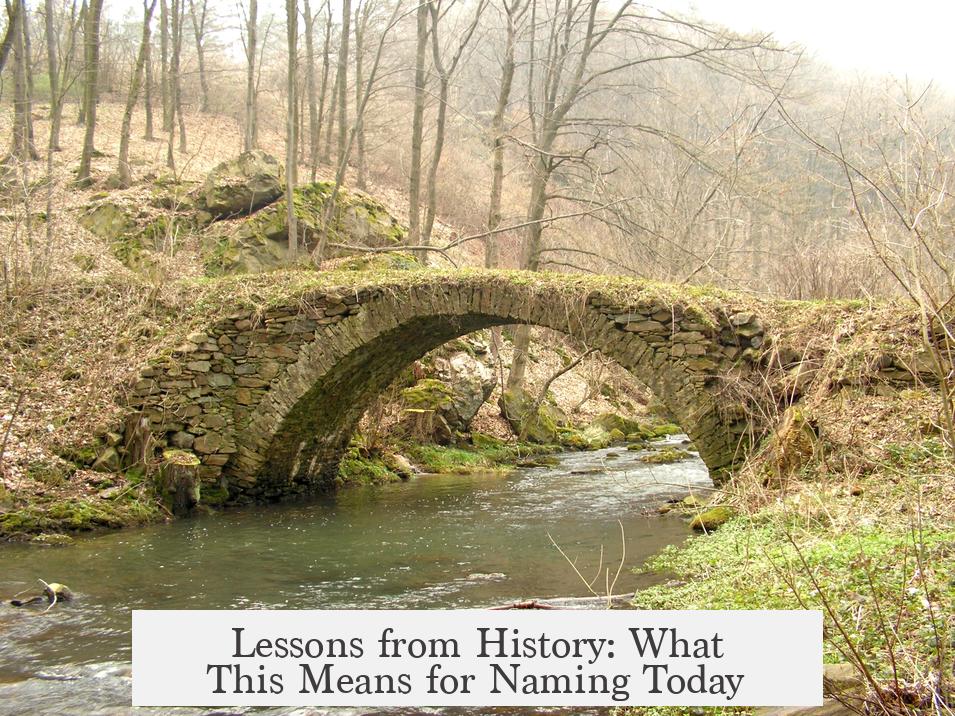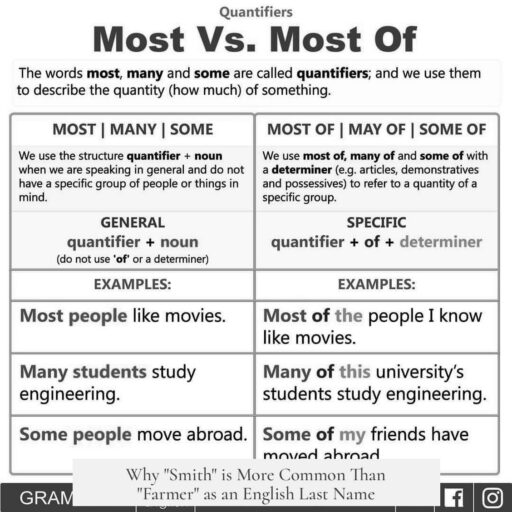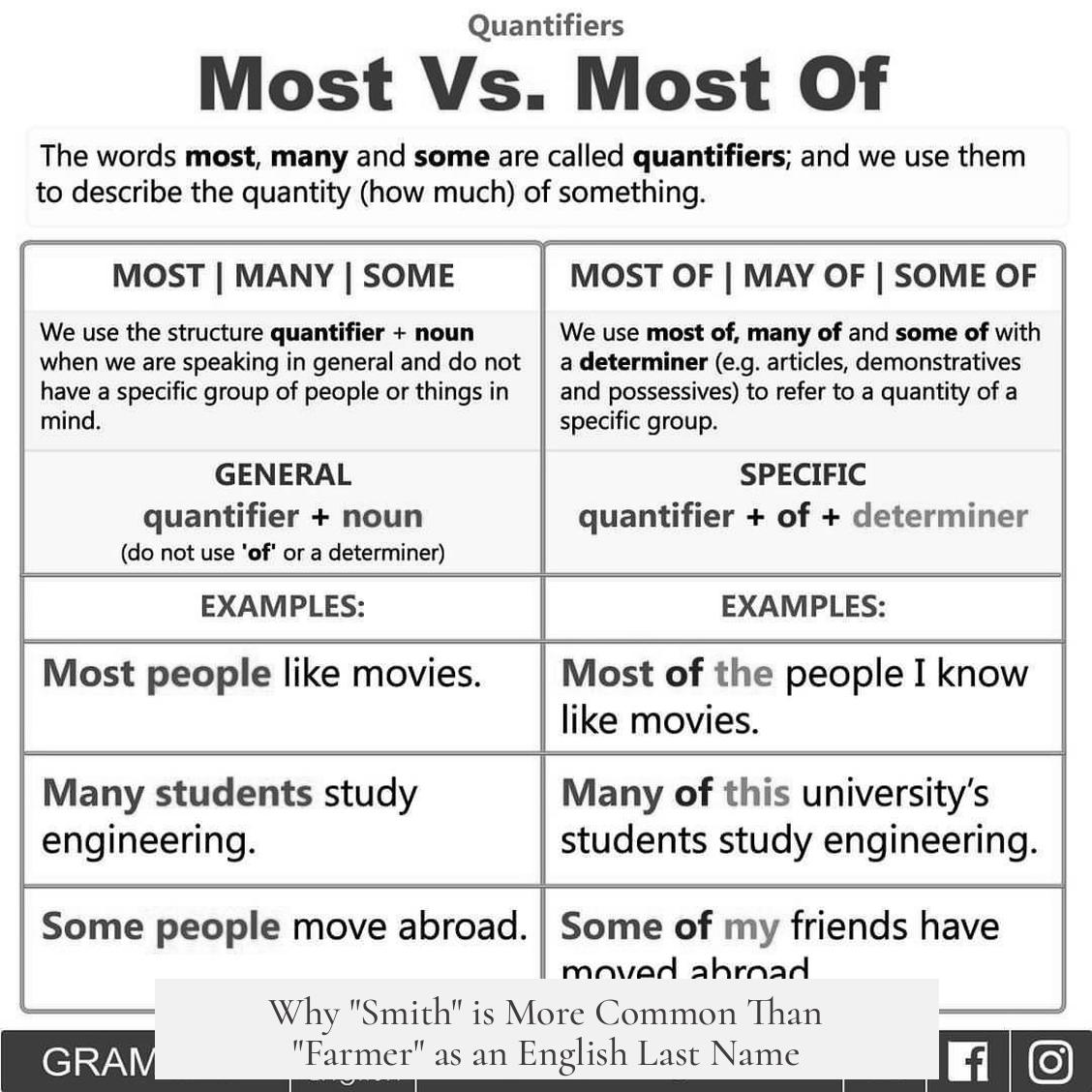“Smith” is the most common last name in English because it reflects a specific, specialized occupation that stood out in mostly rural medieval communities, whereas “farmer” described a broad and common way of life that lacked the distinction needed for surnames.
During the Middle Ages, surnames began to form largely in urban or proto-urban settings, where specialized jobs were common. Names like Smith, Baker, or Carpenter identified distinct roles within a community or economy. Farming, by contrast, was not viewed as a single specialized occupation but rather a shared lifestyle for most people in rural areas. Villagers farmed, plowed, raised animals, and repaired tools without strict job titles. This lack of specialization made “Farmer” a poor choice for a name that had to set individuals apart.
Social identity then relied heavily on kinship and family relationships. Since almost everyone farmed, calling oneself “Farmer” offered no meaningful distinction in these agricultural villages. Instead, people used names connected to unique skills or landmarks. The smith, who worked with metal, filled a vital and skilled role—often serving an entire area—and was rare enough to provide a clear, differentiating surname.
Interestingly, the name Smith also relates to a location—the smithy, or blacksmith’s workshop. Many with the Smith surname may have lived near such a place rather than practicing the trade, adding to the name’s prevalence.
Surname frequency indexes count spelling variants separately. Names like Smith have fewer variants, helping maintain high rankings. Other name types, such as patronyms, have many forms that dilute their individual visibility. This technical aspect reinforces Smith’s dominance in modern surname lists.
| Factor | Explanation |
|---|---|
| Occupational Specialization | Smiths had a unique, skilled role; farmers did not. |
| Social Identity | Farmers lacked uniqueness; families identified by kinship instead. |
| Location | Smith also tied to the place (smithy), increasing use. |
| Spelling Variants | Smith has fewer variations, aiding surname ranking. |
- Farming was a common lifestyle, not a distinctive occupation.
- Smith denoted a skilled, necessary trade with clear social identity.
- Smith also referred to a location, broadening surname use.
- Surname records count spellings separately, keeping Smith common.
Why is “Smith” the Most Common Last Name in English, Not Some Variation of “Farmer”?

At first glance, it seems odd. For much of history, the majority of people were farmers. So why doesn’t the surname “Farmer” dominate English last names? Instead, “Smith” holds that crown. It’s the most common surname, frequently topping charts across English-speaking countries. Let’s unravel the mystery behind this curious discrepancy.
The answer lies deep in **history, social structures, and naming customs** that seem to flip what you might expect.
Occupational Names: The Tale of Towns Versus Countryside
Occupational surnames often grew from urban or proto-urban environments. Cities and towns, budding in the early to central Middle Ages, developed specialized economies and workforces. When a society becomes more specialized, names that reflect specific jobs become useful. People needed ways to distinguish themselves from one another in crowded markets or bustling streets.
Here is the interesting part: rural life, which was predominantly farming-based, did not follow this trend. Why? Because farming was more a way of life than a single standout job.
Why Farming Wasn’t “Special” Enough for a Last Name
In the Middle Ages, farming was hardly specialized. Villagers ploughed, tended animals, fixed fences, and harvested together. Everyone did similar jobs. To call yourself “Farmer” would be like everyone in your neighborhood calling themselves “Person.” It simply lacked distinctiveness.
Think about it. If all your neighbors share the label “Farmer,” it tells no one anything useful to distinguish families, individuals, or places.
The point here: Farming functioned as a broad lifestyle rather than a unique occupation. In modern terms, it was a *chore* rather than a *title*.
The Smith: A Job That Stands Out, Even in the Countryside

Unlike farming, the occupation of a smith—blacksmith, metalsmith, or other related trades—carried clear specialization. Most villages had just one or maybe two smiths. They forged tools, fixed ploughs, shod horses, and created household items vital to daily life.
This rarity gave smiths a certain social prominence. Their specialty made “Smith” a much more meaningful identifier. They weren’t just “another farmer.” Being a smith meant serving a crucial, uncommon role in the community.
Also, smiths were known by their workshop locations—the physical “smithy.” Some people got the name because they lived by a smithy, not because they worked as one. This spatial association further cemented the name’s use.
It’s All About Identity: Why Names Must Distinguish
In small rural communities, personal identity often hinged on family relationships or distinctive traits. Simply calling yourself and your kin “Farmers” was uninformative. People needed surnames that set families apart.
“Smith,” with its tie to a skilled trade, fulfilled this need perfectly. It *said* something important about who you were and what you did. Naming conventions often aimed to reduce confusion, making occupations like smithing ideal surnames.
Variations and Spelling: The Hidden Complexity
Another quirk of why “Smith” wins? Its spelling variations are few. This helps it retain frequency popularity in name indexes. Compare that to names based on personal names or patronyms. Those often splinter into countless variants, diluting their individual prominence.
For example, “Farmer” has fewer variants, but the social conditions didn’t encourage its adoption as eagerly. Meanwhile, variants of “Smith,” like Smyth or Schmidt (in Germanic regions), cluster closely, further boosting the core name’s recognition.
Put simply: **Smith** is stable, recognizable, and widespread in spelling and use.
Lessons from History: What This Means for Naming Today

This historical nugget teaches us that names reflect not just jobs but social contexts. It’s not enough to do the most common job; your job has to *stand out* to influence family names.
In today’s urbanized, post-industrial world, surnames like “Farmer” feel quaint but might never climb in popularity. Specialized professions or unique identifiers dominate.
Curious what your surname says about your family’s past? Think beyond the obvious. Sometimes, a locksmith or baker in the family tree might hold more weight than a general “worker.”
Practical Tips When Tracing Family Names
- Investigate whether your ancestor’s surname refers to occupation or location.
- Look for historical clusters of surnames in urban centers versus rural hubs.
- Remember spelling variations matter. A Smith in one record might be Smythe in another.
- Use local history resources to understand if “Farmer” was ever prominent in your ancestral community.
Final Thought
“Nickname + specialization = a surname that sticks.”
Why does Smith top the list? It’s occupational clarity, social distinctiveness, and steady spelling that matter—not just the majority job of farming.
Who knew that the very thing almost *everyone* did was too ordinary for your last name? It makes us wonder—what modern professions today might be too “common” to become famous surnames in the future? Food for thought while you ponder your own name’s origin at the next family dinner.




